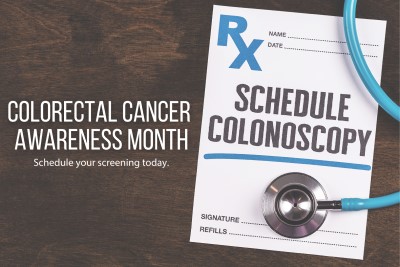
Special to Iredell Free News
Colorectal cancer is expected to cause approximately 53,000 deaths across the nation in 2021, according to the American Cancer Society. This makes colorectal cancer a leading cause of cancer-related deaths in the United States for both men and women.

However, over 90 percent of colorectal cancers can be cured if found early.
With a disease this prevalent, getting regular screenings, or colonoscopies, is crucial. As we near the end of National Colorectal Cancer Awareness Month, it is imperative to schedule your colonoscopy to detect colorectal cancer early and lower your risk factors.
And, while most people believe a colonoscopy is painful, according to Dr. Nikhiel Rau, a gastroenterologist at the Comprehensive Digestive Care Center of Piedmont HealthCare, that’s a
myth.
In fact, the average length of a colonoscopy is only 20 minutes long and is done under sedation that helps you comfortably sleep through the entire procedure.Nikhiel
What is colorectal cancer?
Colorectal cancer is a disease that starts in your lower digestive tract, specifically the colon or rectum. Cancer develops when a small growth, called a polyp, forms in your colon or rectum and becomes cancerous.
“The colon is a very active area. The lining of the colon regenerates itself every two days,” Rau explained. “Since the colon is an area of such high activity, the chance for abnormal cell growth is
very high.”
According to Rau, the chances of developing precancerous polyps are very common. These precancerous polyps can turn into cancer if not identified and removed.
What are the symptoms of colorectal cancer?
Symptoms cancer can vary. However, the most common symptoms are rectal bleeding, unintentional weight loss, anemia, frequent cramping in your lower stomach, fatigue, and changes in your bowel habits. Rau encourages you to get a colonoscopy if you are experiencing these symptoms.
According to Rau, patients with colorectal cancer may be asymptomatic, making it that much more necessary to begin preventive screening.
Who is at risk?
There are two types of risk factors for colorectal cancer: factors we cannot control and modifiable risk factors. Risk factors we cannot control include a family history of colorectal cancer and genetics. Examples of modifiable risk factors include obesity, smoking, inactivity, high red meat consumption, and low leafy greens consumption.
You can reduce or modify your risk factors for colorectal cancer in a variety of ways. A healthy portion of cooked red meat is about the size of a deck of playing cards. Limiting yourself to six or fewer servings of red meat a week can help prevent colorectal cancer. Additionally, eating healthy foods that are high in fiber may reduce your risk. Quitting smoking, limiting your alcohol intake, and exercising regularly can also lower your risk.
Should I get screened?
There are many different screening options for colorectal cancer. However, the most common colorectal cancer screening test is a colonoscopy.
“The advantage of a colonoscopy is that it can both diagnose and treat cancer,” said Rau.
If there is a cancerous polyp found during a colonoscopy, a doctor can diagnose it as cancerous and remove it all in the same procedure.
According to Rau, if you have no family history of colorectal cancer, you should start screening at age 45. But, if you do have a family history of colon cancer, you should begin screening sooner. Typically, Rau suggests 10 years before the age of onset in your relative. For example, if your father was diagnosed with colon cancer at age 40, you should get your first colonoscopy at age 30. If your family member was diagnosed with colorectal cancer over the age of 50, you should get your colonoscopy at age 40, no matter what.
“Colorectal cancer is often preventable if you know your risks and get routine screenings. The whole point of a colonoscopy is to prevent colon cancer from ever developing,” said Rau.
LEARN MORE
To learn more, visit iredellhealth.org/health-library, where you can find additional colorectal cancer resources, including a risk assessment and an educational quiz. If you have concerns or need to schedule a colonoscopy, reach out to your healthcare provider.
About Iredell Health System
Iredell Health System includes Iredell Memorial Hospital; Iredell Home Health; Iredell Wound Care & Hyperbaric Center; Community and Corporate Wellness; Occupational Medicine; the Iredell Physician Network and more. Iredell Memorial Hospital is the largest and only nonprofit hospital in Iredell County. The comprehensive healthcare facility has 247 beds; more than 1,700 employees; and has 260 physicians representing various specialties. Centers of excellence include Women’s and Children’s; Cardiovascular; Cancer; Surgical Services and Wellness & Prevention. The mission of Iredell Health System is to inspire wellbeing. For a comprehensive list of services and programs, visit www.iredellhealth.org.



